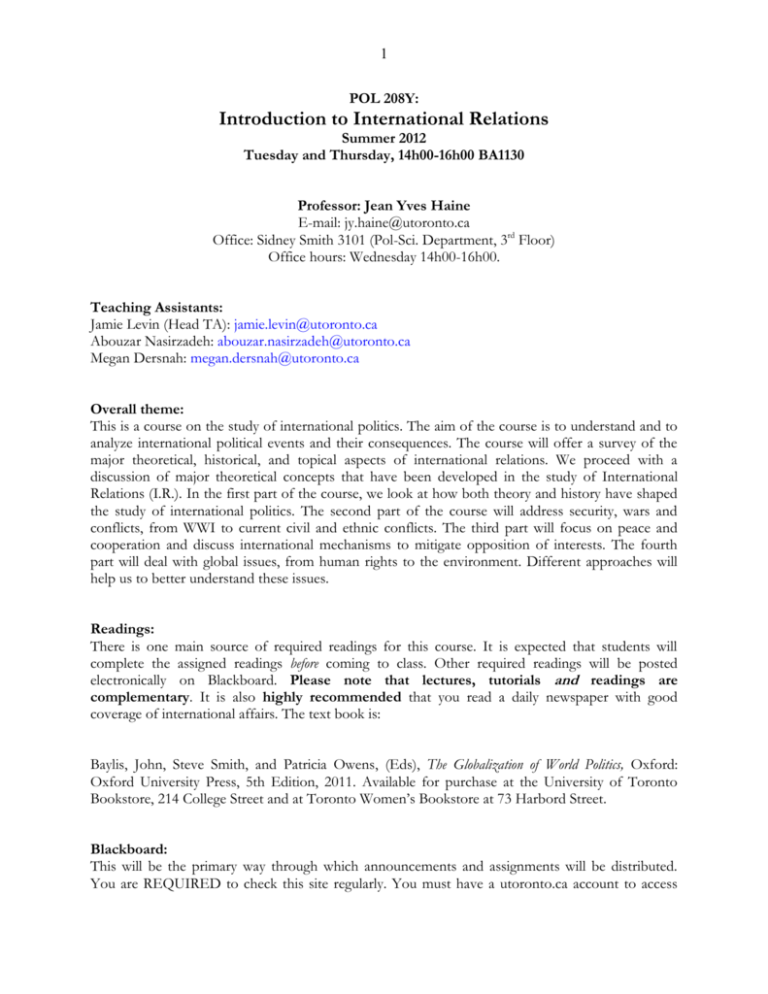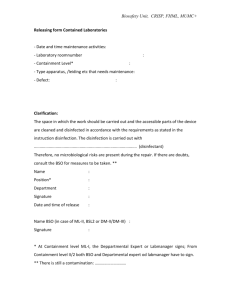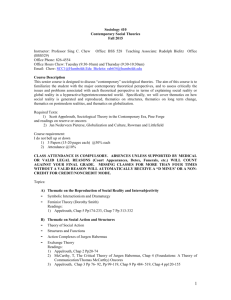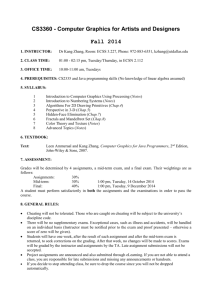POL 208Y: Introduction to International Relations
advertisement

1 POL 208Y: Introduction to International Relations Summer 2012 Tuesday and Thursday, 14h00-16h00 BA1130 Professor: Jean Yves Haine E-mail: jy.haine@utoronto.ca Office: Sidney Smith 3101 (Pol-Sci. Department, 3rd Floor) Office hours: Wednesday 14h00-16h00. Teaching Assistants: Jamie Levin (Head TA): jamie.levin@utoronto.ca Abouzar Nasirzadeh: abouzar.nasirzadeh@utoronto.ca Megan Dersnah: megan.dersnah@utoronto.ca Overall theme: This is a course on the study of international politics. The aim of the course is to understand and to analyze international political events and their consequences. The course will offer a survey of the major theoretical, historical, and topical aspects of international relations. We proceed with a discussion of major theoretical concepts that have been developed in the study of International Relations (I.R.). In the first part of the course, we look at how both theory and history have shaped the study of international politics. The second part of the course will address security, wars and conflicts, from WWI to current civil and ethnic conflicts. The third part will focus on peace and cooperation and discuss international mechanisms to mitigate opposition of interests. The fourth part will deal with global issues, from human rights to the environment. Different approaches will help us to better understand these issues. Readings: There is one main source of required readings for this course. It is expected that students will complete the assigned readings before coming to class. Other required readings will be posted electronically on Blackboard. Please note that lectures, tutorials and readings are complementary. It is also highly recommended that you read a daily newspaper with good coverage of international affairs. The text book is: Baylis, John, Steve Smith, and Patricia Owens, (Eds), The Globalization of World Politics, Oxford: Oxford University Press, 5th Edition, 2011. Available for purchase at the University of Toronto Bookstore, 214 College Street and at Toronto Women’s Bookstore at 73 Harbord Street. Blackboard: This will be the primary way through which announcements and assignments will be distributed. You are REQUIRED to check this site regularly. You must have a utoronto.ca account to access 2 this service (please go to Robarts Library if you do not already have an account). It is your responsibility to log into Blackboard to access the information posted regarding the course (portal.utoronto.ca). Accessibility Needs: The University of Toronto is committed to accessibility. If you require accommodations for a disability, or have any accessibility concerns about the course, the classroom materials, please contact Acessibility Services as soon as possible: disability.services@utoronto.ca or visit http://studentlife.utoronto.ca/accessibility Course Requirements: In this course, you will be evaluated on the basis of two in-class midterms, one written paper, a takehome essay, and your participation in tutorial. The breakdown of your course grade is as follows: First Written Assignment: (June 5th): 15 % Midterm 1 (June 21st): 20% Midterm 2 (August 2nd): 20% Take-Home Essay (August 9th ): 25% Tutorial: 20% All students’ course grades will be given based on his/her performance on the assignments in the course, according to the above percentages. There are NO exceptions. Midterms are closed-book, closed-note tests. The topics covered by each midterm will be clarified in lecture ahead of time. The first paper assignment will be 5 pages long maximum. It will require no outside research to complete. The take-home essay, due on the last day of the course, will be an 8-10 page long maximum that will require no outside research either. The prompts for these assignments will be distributed at least two weeks before they are respectively due. (See also point 5 below). Tutorial attendance is crucial to your success in this course. Your tutorial leader will discuss themes from the readings and lecture, and review any questions that students may have. You may have assignments designed to clarify challenging material. Your grade in tutorial is based on attendance and informed participation. Attending fewer than 60% of your tutorials can lead to a tutorial grade of 0%. Tutorials will meet beginning Week 3. Grade Appeals: If you are unhappy with a grade on an assignment, you may submit a written appeal the Head TA, explaining why you feel your grade on an assignment is unjustified. You must submit this written appeal no later than two weeks after your assignment is returned. Be warned: re-grades do not result in an automatic increase in the grade, as assignments must be evaluated anew. Your grade may stay the same, go up, or go down. Please also note that changes to student grades on assignments will only be considered if there is demonstrable error in the calculation of a particular score. You must submit a written appeal in order to have a grade reevaluated. If you are still unhappy after your TA’s re-grade, you may contact the Head TA to request an instructor re-grade. These re-grades will be granted only in cases where it is deemed necessary by the Head TA or instructor. 3 Other Rules and Regulations: Please read the following carefully. By registering in this course, you agree to abide by the rules below: 1) All work must be submitted on time, on paper in order to avoid penalty. There are no exceptions. No assignments will be accepted via email, fax, or under the instructor’s door. You must come to class and turn in your assignments. 2) ALL assignments completed at home MUST be turned in at the beginning of lecture. Failure to do so will result in counting the assignment as 1 day late. See #3. 3) The penalty for work turned in after the stated deadline will be 4 % per day. This includes holidays and weekends. No grace period will be given, unless you have been granted an extension. Late papers must be turn in to the office of the Department of Political Science, Sidney Smith Building, third floor. 4) Extensions will only be granted with “good reason,” and only with permission of the instructor of the course in advance of the assignment due date. Having work responsibilities, multiple assignments/exams in this and other classes, or “being stressed” are not “good reasons.” Extensions are rarely granted, and only under extreme circumstances. You must show documentation of your reason for requesting an extension (e,g., doctor’s note, hospital records). a. For paper extensions, please speak directly to the Head TA. b. For midterm extensions, please speak directly to Head TA. c. There will be NO extensions granted on the take-home essay. 5) All at-home assignments are to be typed, 12-point Times New Roman, double-spaced, 1” (2.5 cm) margins. Do not disregard these measurements. Staple your assignment in the upper left-hand corner and don’t forget to put your name on it. 6) You cannot “make up” missed tutorials with alternative assignments. If you have reasons for not attending a tutorial (trips, appointments, etc.), you should talk to you TA before the tutorial to make arrangements. Be aware that missing more than 40% of your tutorials can lead to a tutorial grade of 0%. 7) Academic Honesty: When you use other people’s words and ideas, you must properly cite them, whether these words come from the readings, the Internet, or in class. Failing to do so constitutes plagiarism, and is a very serious academic offense. From the Code of Behaviour on Academic Matters, it is clearly written that: “It shall be an offence for a student knowingly to represent as one’s own any idea or expression of an idea or work of another in any academic examination or term test or in connection with any other form of academic work, i.e. to commit plagiarism. Wherever in the Code an offence is described as depending on “knowing”, the offence shall likewise be deemed to have been committed if the person ought reasonably to have known”. Obviously it is against the rules to buy essays or copy from your friends’ homework, and it’s also plagiarism to borrow passages from books or articles or websites without identifying them. You know that the purpose of any paper is to show your own thinking, not create a 4 patchwork of borrowed ideas. The point of documenting sources in academic papers is not just to avoid unpleasant visits to the Dean’s office, but to demonstrate that you know what is going on in your field of study. Get credit for having done your reading! Precise documentation is also a courtesy to your readers because it lets them look at the material you’ve found. That’s especially important for Internet sources. Please do not hesitate to consult myself or your TA if you have any questions. Feel free to consult also: http://www.utoronto.ca/writing/plagsep.html. 8) Final grades are … final. Please do not try to negotiate your grade with the instructor or your TA. Grades are calculated according to the above percentages, assessing your performance on all of the class assignments. They are not arbitrary. You should ask for help before an assignment, we are always happy to answer your questions. Office hours are there for you, so please use them. Making the effort before the grades are turned in will always be more beneficial to you than making the case afterward for why you need two extra points. Schedule of Topics and required Readings: 1) May 15th : Introduction 2) May 17th : Making sense of Globalization Baylis, Smith, and Owen (BSO), Chap. 1. Amartya Sen, “How to judge Globalism”, in Mark Kesselman, The Politics of Globalization: A Reader, New York, Houghton Mifflin Co., 2007, pp. 28-36. Niall Ferguson, “Sinking Globalization”, in Mark Kesselman, The Politics of Globalization: A Reader, New York, Houghton Mifflin Co., 2007, pp. 50-56. 1) Theoretical Tools 3) May 22nd : Realism(s) BSO, Chap. 5. Hans J. Morgenthau, “Six Principles of Political Realism”, in Phil Williams, Donald M. Goldstein and Jay Schwartz, Classic Readings and Contemporary Debates in International Relations, Thomson Wadsworth, 3rd Edition, pp. 57-62. 4) May 24th : Liberalism(s) BSO, Chap. 6. Woodrow Wilson, “The Fourteen Points”, in Phil Williams, Donald M. Goldstein and Jay Schwartz, Classic Readings and Contemporary Debates in International Relations, Thomson Wadsworth, 3rd Edition, pp. 33-36. 5) May 29th : Constructivism(s) BSO, Chap. 9. Alexander Wendt, “Anarchy is What States Make of It: The Social Construction of Power Politics”, in Phil Williams, Donald M. Goldstein and Jay Schwartz, Classic Readings and Contemporary Debates in International Relations, Thomson Wadsworth, 3rd Edition, pp. 352-373. 5 6) May 31st : Decision-makers, Decision-making Graham T. Allison, “Conceptual Models and the Cuban Missile Crisis”, in Phil Williams, Donald M. Goldstein and Jay Schwartz, Classic Readings and Contemporary Debates in International Relations, Thomson Wadsworth, 3rd Edition, pp. 178-209. 2) Security, Wars and Conflicts 7) June 5th : Total Wars BSO, Chap. 3. Please Note: First Written Assignment due at the beginning of the lecture. 8) June 7th : The Cold War BSO, Chap. 4. John Lewis Gaddis, “The Long Peace: Elements of Stability in the Postwar International System”, in Phil Williams, Donald M. Goldstein and Jay Schwartz, Classic Readings and Contemporary Debates in International Relations, Thomson Wadsworth, 3rd Edition, pp. 506-521. 9) June 12th : Contemporary Conflicts BSO, Chap. 13. 10) June 14th : International Terrorism BSO, Chap. 22. Thomas Homer-Dixon, “The Rise of Complex terrorism”, in Phil Williams, Donald M. Goldstein and Jay Schwartz, Classic Readings and Contemporary Debates in International Relations, Thomson Wadsworth, 3rd Edition, pp. 653-660. 11) June 19th : Nuclear Weapons BSO, Chap. 23. Scott Sagan, “Why do States Build Nuclear Weapons? Three Models in Search of a Bomb.” International Security, Vol. 21, n°3 (Winter, 1996-1997), pp. 54-86. 12) June 21st : Mid-Term n°1 Mid-Term Test n°1. (Don’t forget a pen!!!) Location TBA 3) Creating and Managing Peace and Cooperation 13) July 3rd : The Democratic Peace John M. Owen, “How Liberalism Produces Democratic Peace.” International Security, Vol. 19, No. 2 (Autumn, 1994), pp. 87-125. 14) July 5th : International Political Economy BSO, Chap. 15. 6 Susan Strange, “The Retreat of the State”, in, Mark Kesselman, The Politics of Globalization: A Reader, New York, Houghton Mifflin Co., 2007, pp. 210-216. Saskia Stassen, “The State and Globalization”, in Mark Kesselman, The Politics of Globalization: A Reader, New York, Houghton Mifflin Co., 2007, pp. 228-2243. 15) July 10th : International Law and International Norms BSO, Chap. 17. Martha Finnemore and Kathryn Sikkink, “International Norm Dynamics and Political Change.” International Organization, Vol. 52, n°4, (Autumn 1998), pp. 889-917. 16) July 12th : International Organizations: The UN System BSO, Chap. 19. Eric Helleiner, “A Bretton Woods moment? The 2007–2008 crisis and the future of global finance”, International Affairs, Vol. 86, n°3, (May 2010), pp. 619–636. 17) July 17th : Transnational Actors BSO, Chap. 20. Margaret E. Keck and Kathryn Sikkink, “Activists Beyond Borders: Advocacy networks in International Politics”, in Mark Kesselman, The Politics of Globalization: A Reader, New York, Houghton Mifflin Co., 2007, pp. 368-379. 4) Global issues 18) July 19th : Environmental Issues BSO, Chap. 20. 19) July 24th : Human Rights and Humanitarian Intervention BSO, Chap. 30 and Chap. 31. Michael Walzer, “The argument about humanitarian intervention” and Michael Ignatieff, “Intervention and State failure”, both in Dissent, Vol. 49, n°1, (Winter 2002), pp. 29-37 and pp. 114123. 20) July 26th : Globalization and Inequality BSO. Chapter 28. David Dollar and Aart Kraay, “Spreading the Wealth”, in Mark Kesselman, The Politics of Globalization: A Reader, New York, Houghton Mifflin Co., 2007, pp. 124-138. Martin Wolf, “Why Globalization Works”, in Mark Kesselman, The Politics of Globalization: A Reader, New York, Houghton Mifflin Co., 2007, pp. 148-156. 21) July 31st : Regional and Global Governance BSO, Chap. 26. Elke Krahmann, “National, Regional and Global Governance: One Phenomenon or Many?”, in Mark Kesselman, The Politics of Globalization: A Reader, New York, Houghton Mifflin Co., 2007, pp. 252-261. Jorge G Castañeda, “Not Ready for Prime Time”, Foreign Affairs, Vol. 89, n°5, (Sep/Oct 2010), pp. 109-123. 7 22) August 02nd : Mid-term n°2. Mid-Term Test n°2. (Again, a pen will be necessary) 23) August 07th : US Hegemony and future world (dis)orders BSO. Chapter 33. Ikenberry John, “Liberal Hegemony or Empire? American Power in the Age of Unipolarity”, in Mark Kesselman, The Politics of Globalization: A Reader, New York, Houghton Mifflin Co., 2007, pp. 299-313. Niall Fergusson, “Colossus: The price of America’s Power”, in Mark Kesselman, The Politics of Globalization: A Reader, New York, Houghton Mifflin Co., 2007, pp. 340-349. 24) August 09th : Questions unanswered Please note: Take-home Essay due at the beginning of lecture. No exception!!! ___________________________________




